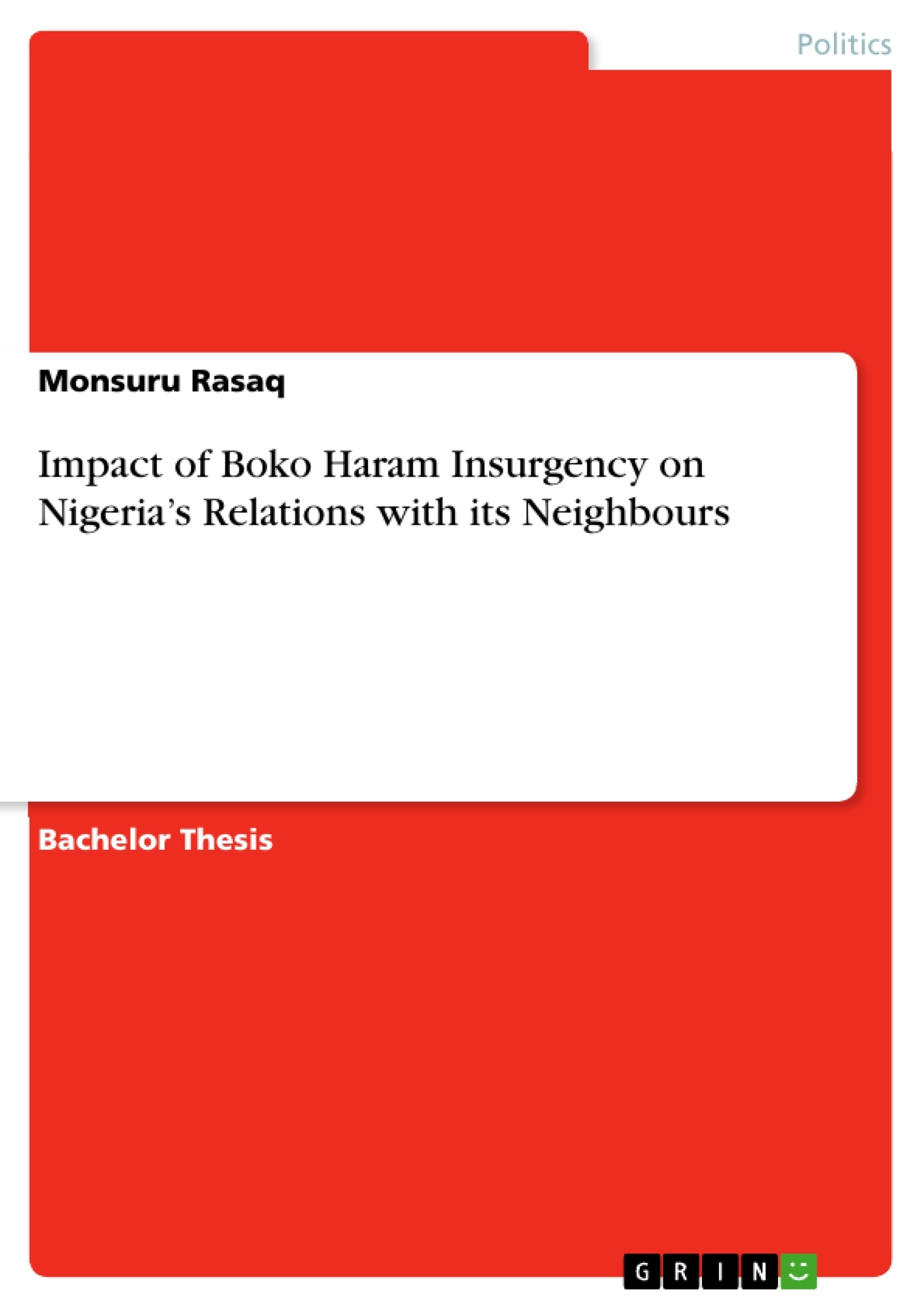This study unravels the impact of Boko Haram insurgency on Nigeria’s relations with its Neighbours. This study analyses the nature and character of Nigeria’s neighbours and discovers that it is most time responsible for a low profile in Nigeria’s foreign policy gesture towards them. This phenomenon is not unconnected to their perception of Nigeria as a hegemonic power in its neighbourhood given Nigeria demographic, economic and military preponderance over them. This perception of Nigeria by its neighbours has over the years contributed to their frosty relations notably; the hostile gestures of Chad and Cameroon towards Nigeria, the security concern that the internal crisis in Chad in the 1970s generated for Nigeria coupled with the presence of French forces in N’Djamena at the eve of the Nigerian Civil War. The study draws the attention to how Boko Haram insurgency further influences Nigeria’s relations with its neighbours. The outreach of Boko Haram insurgency beyond the boundary of Nigeria to include that of Nigeria’s neighbours has worsened the existing frosty relations among them. This is true if one considers the fact that the activities of the Boko Haram have gone beyond the north-eastern part of Nigeria, with its violent attacks on the Nigerien soil compounding the already existing economic crisis in Niger Republic, kidnapping of prominent citizens of Cameroon and foreign nationals for ransom motive, its use of Chad as a safe haven and notably, its thwarting of Nigeria’s influence in its neighbourhood, Boko Haram insurgency has forced Nigeria to concentrate more on its domestic issue. The study therefore, concludes by recommending to the government to adopt policies that are expansive and inclusive to address the crisis among which is the revamping of the socioeconomic condition and that attention should be given to border management and administration.
Inhaltsverzeichnis (Table of Contents)
- CHAPTER ONE
- INTRODUCTION
- Background to the Study
- Statement of Problem
- Research Questions
- Research Objectives
- Significance of the Study
- Scope and Limitations of the Study
- Literature Review
- Theoretical Framework
- Research Methodology
- Organisation of the Study
- CHAPTER TWO
- PRELIMINARY SURVEY
- Understanding Neighbours
- Conceptualising Insurgency
- Understanding Nigeria in its Neighbourhood
- Nature and Character of Nigeria's Neighbours
- CHAPTER THREE
- HISTORICIZING THE BOKO HARAM INSURGENCY
- Origin of the Boko Haram Sect
- Leadership and the Growth of the Boko Haram Group
- Mode of Operation of Boko Haram
- Boko Haram Networks
- CHAPTER FOUR
- IMPACT ASSESSMENT OF BOKO HARAM INSURGENCY AND NIGERIA'S RELATIONS WITH ITS NEIGHBOURS
- Nigeria's Relations with Niger Republic
- Nigeria's Relations with Chad
- Nigeria's Relations with Cameroon
- Nigeria's Relations with other Neighbours
Zielsetzung und Themenschwerpunkte (Objectives and Key Themes)
This study aims to investigate the impact of the Boko Haram insurgency on Nigeria's relations with its neighboring countries. The research explores the nature and character of Nigeria's neighbors and their perception of Nigeria as a regional hegemon, examining how this perception influences bilateral relations. The study also investigates the impact of Boko Haram's activities on Nigeria's relations with its neighbors, focusing on the insurgency's spillover effects and its implications for regional stability.
- The nature and character of Nigeria's neighbors
- Perception of Nigeria as a hegemonic power
- Impact of Boko Haram insurgency on Nigeria's relations with its neighbors
- Spillover effects of Boko Haram insurgency
- Implications of Boko Haram insurgency for regional stability
Zusammenfassung der Kapitel (Chapter Summaries)
Chapter One introduces the background to the study, outlining the significance of the Boko Haram insurgency and its impact on Nigeria's regional relations. It also defines the research problem, research questions, objectives, and methodology employed in the study. Chapter Two provides a preliminary survey of the concept of neighbors and insurgency, defining key terms and concepts related to the study. It also analyzes the geopolitical context of Nigeria and its neighbors, emphasizing the role of Nigeria's perceived hegemony in the region. Chapter Three examines the historical development of the Boko Haram insurgency, tracing its origins, leadership, and modes of operation. The chapter also explores the network structures of the group and its evolving objectives over time. Chapter Four investigates the impact of the Boko Haram insurgency on Nigeria's relations with its neighbors, specifically focusing on the relationships between Nigeria and Niger, Chad, Cameroon, and other neighboring countries. This chapter explores the ways in which the insurgency has strained relations and exacerbated existing challenges. Chapter Five draws conclusions from the study, summarizing key findings and highlighting the broader implications of the Boko Haram insurgency for Nigeria's regional relations.
Schlüsselwörter (Keywords)
The study focuses on the impact of the Boko Haram insurgency on Nigeria's relations with its neighbors, exploring concepts such as regional hegemony, spillover effects, and regional stability. Key themes include the perception of Nigeria as a regional power, the historical development of the Boko Haram insurgency, the impact of the insurgency on bilateral relations, and the implications for regional security. The study also analyzes the role of factors such as demographic and economic disparities, historical tensions, and security concerns in shaping Nigeria's relations with its neighbors.
- Citar trabajo
- Monsuru Rasaq (Autor), 2016, Impact of Boko Haram Insurgency on Nigeria’s Relations with its Neighbours, Múnich, GRIN Verlag, https://www.grin.com/document/372063



